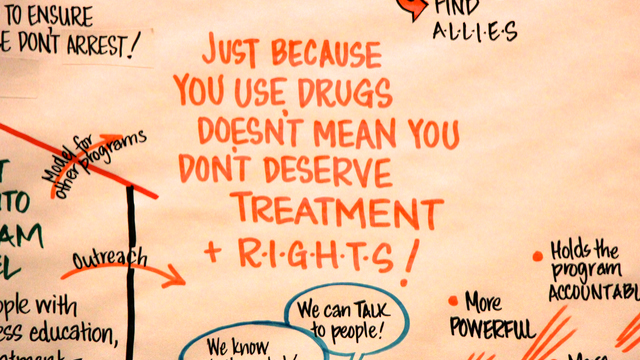The Commissioner for Fundamental Rights, responding to a complaint submitted by the Hungarian Civil Liberties Union (HCLU), found that the closure of the largest needle and syringe program in Budapest violated the right to health. The mayor is now accusing the ombudsman of “being controlled by the drug lobby”.
Last November, the HCLU submitted a complaint to the Commissioner for Fundamental Rights, asking him to investigate political attacks by the mayor of the 8th district of Budapest against the needle and syringe program operated by the Blue Point NGO. The ombudsman produced a comprehensive report on the situation but the report was published only after the needle exchange program closed at the end of August (read our article here!).
In his report, the ombudsman, referring to a previous ruling of the Constitutional Court, defines the violation of the right to the highest attainable standard of health as an “exceptional, extreme shortfall in access to health care”. Closure of an existing harm reduction serivce, in an area where large numbers of marginalised injecting drug users live, and where the risk of infections is high, is precisely such an exceptional case.
“We cannot forget the fact that this program, terminated because of the decision of the mayor of the 8th district of Budapest, was an evidence-based intervention supported by the national drug strategy of the Hungarian government,” the ombudsman points out. “Such termination, without replacement by other services, violates the principle of the progressive realisation of the right to health.”
The Drugreporter's campaign movie featuring harm reduction in the 8th district (turn English captions on!)
The ombudsman made several recommendations to policy-makers. He requested the mayor, Máté Kocsis, to provide access to harm reduction services for drug users. He urged the Minister of Human Resources to help to clarify the role of needle and syringe programs, and recommended creating a Drug Coordination Forum for Budapest, in order to make drug policy responses in the city more effective.
The district mayor has not accepted the recommendations, and has accused the ombudsman of “being controlled by the drug lobby”. A pro-government newspaper, Magyar Nemzet, published leaked correspondence between the HCLU’s drug policy program director and a staff member in the Commissioner’s office, in which the program director discusses the timing of the publication of the report at the end of April. The correspondence provides absolutely no evidence that there was any inappropriate communication between the two, but the mayor used this leak to 'prove' that the ombudsman’s investigation was not impartial. In fact the real goal of the HCLU was to have the report published much earlier, before the closure of the needle exchange.
Read more about the growing political paranoia about civil society in Hungary!




